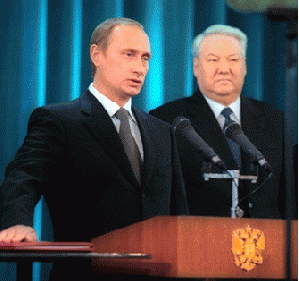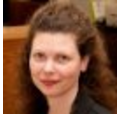
Putin and Yeltsin cropped
(Image by (From Wikimedia) Presidential Press and Information Office, Author: Presidential Press and Information Office) Details Source DMCA
Many westerners are understandably disillusioned with Western policies and culture (largely led by the US), both of which have degenerated. The former into unabashed imperialism, militarism (both at home and abroad), and oligarchy and the latter into crass consumerism, sexual exhibitionism and social alienation. Consequently, many of these people are looking for something.
Enter into this picture, Russian president Vladimir Putin -- pointing out the tragic folly of western policies (again, largely led by Washington) on the world stage in public forums, countering said folly with a combination of diplomacy and limited military actions in reaction to western provocations and general mess-making. Simultaneously, in the search for social glue, Putin has encouraged a re-discovery of Russia's pre-Soviet cultural heritage, with the Orthodox Church playing a significant role and Russians' social conservatism acknowledged. All this reflects the concept of boundaries, rootedness and order where the west seems to have long-forgotten each in the arrogant belief it doesn't need them.
There is also a strong sense of duty and loyalty that Putin personally values -- sometimes to an extreme. These qualities make him attractive to western conservatives, despite the fact that in many ways he is a statist.
In previous writings, I have debunked a number of myths propagated by the western mainstream media that portray Putin as some archetypal monster-villain, Hitler-Stalin-Al Capone-and KGB assassin all rolled into one slipper.
But in my perusal of a wide range of alternative media sites and their comments sections, I have observed another trend, with a segment of people who are viewing Putin as some kind of Messiah figure. Whether right, left or libertarian, these people are justifiably fed up with American empire, propaganda, and the resulting detritus. However, just like the demonizers, some of these people lack nuance and complexity in their analyses and often have little understanding of Russian culture, political history, and the current complex dynamics in the Kremlin which all factor into who Putin is and his decision-making.
I hate to break it to these people, but Putin is not looking to save the world.
Putin is, first and foremost, a Russian patriot and pragmatist who's top priorities are the security and stability of Russia as well as improving Russians' living standards. Anyone who has an understanding of Russian geography and history immediately comprehends these priorities and why they resonate with the Russian people, who overwhelmingly believe that Putin is a good leader, whatever his flaws admittedly may be.
Putin wants to stop Washington's regime change madness in Ukraine and the Middle East because it is seriously destabilizing an area that is in Russia's backyard and, if left unchecked, has the potential to destabilize Russia directly in the future. To the extent that Putin's policies countering the Washington empire may lead to a more peaceful and stable world in the future, it is an ancillary benefit and not necessarily Putin's primary goal.
Putin believes that a multi-polar world with more equitable development and decision-making will provide the conditions in which his three priorities for Russia have the best chance of being fulfilled.
Putin has a history of trying to achieve his real goals using diplomacy and accommodation with the west that is meant to be reciprocal of each party's interests. For example, after the 9/11 attacks, Putin was the first world leader to call president Bush to offer his condolences and support. His reasoning was 2-fold: one, he saw the U.S. and Russia as having a mutual interest in fighting Islamist terrorism; second, he knew that he had a tall order in successfully addressing the many profound problems facing Russia at the time, which included a cratered economy, massive crime and corruption, and the worst mortality crisis since WWII. He would need to put as much time, energy and resources as he could muster into the project of rehabilitating his country -- which meant not wasting precious time, energy and resources in unnecessary conflict with the world's lone superpower. Going against the advice of most of his security team, he provided logistical and intelligence support as well as access to temporary military bases on behalf of the U.S. operation in Afghanistan.
In return for this assistance, Putin received the equivalent of a swift kick in the shins from the Neocon Bush administration in the form of a unilateral withdrawal from the Anti-Ballistic Missile Treaty to pursue a "missile defense shield" in 2002 and the accession of 7 more nations of Eastern Europe into NATO in 2004.
Seemingly undeterred, in 2008, Putin ordered the Russian Foreign Ministry to draft a proposal that Dmitry Medvedev took to Brussels, outlining a security plan that would cover all of the Euro-atlantic community and Russia, obviating the need for NATO's continued existence, much less its expansion.
The preamble states that:
"the use of force or the threat of force against the territorial integrity or political independence of any state, or in any other way inconsistent with the goals and principles of the Charter of the United Nations is inadmissible in their mutual relations, as well as international relations in general.
It also reiterates the intent to cooperatively address any security concerns that may arise among members:
Intending to build effective cooperation mechanisms that could be promptly activated with a view to solving issues or differences that might arise, addressing concerns and adequately responding to challenges and threats in the security sphere.
(Note: You can view every article as one long page if you sign up as an Advocate Member, or higher).





